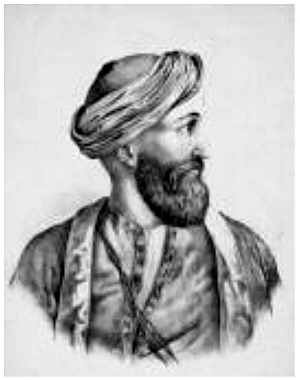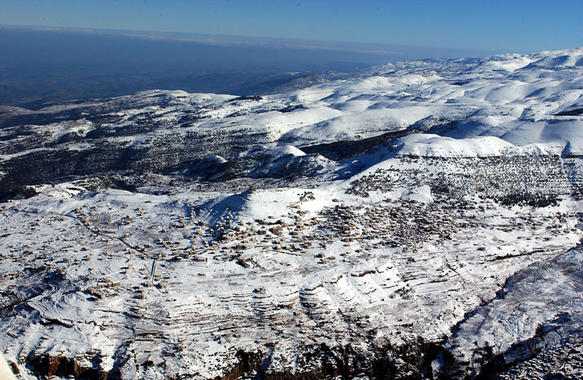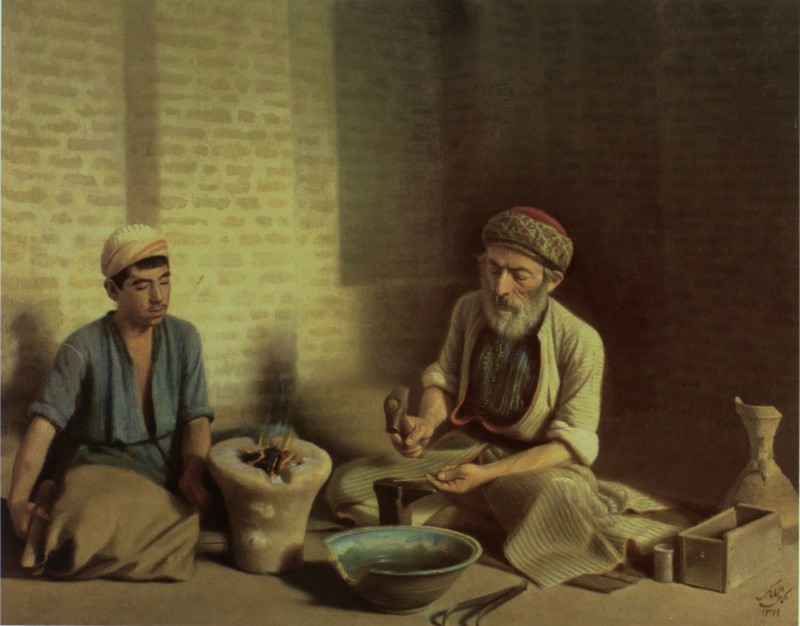|
Mikhail Mishaqah
Mikhail Mishaqa or Michael Meshaka (March 20, 1800 – July 19, 1888; ), also known as Doctor Mishaqa, was born in Rashmayyā, Lebanon, and is reputed to be "the first historian of modern Ottoman Syria"Zachs (2001). as well as the "virtual founder of the twenty-four equal quarter tone scale".Maalouf (2003). Mishaqa's memoir of the 1860 Mount Lebanon civil war is valuable to historians, as it is the only account written by a survivor of the massacre of Syrian Christians in Damascus, Syria. In 1859 he was appointed vice-consul of the United States in Damascus. Personal life Mikhail's great-grandfather, Jirjis Mishaqa I, converted to Greek Catholicism. Jirjis' father, Youssef Petraki (), an ethnic Greek and Orthodox Christian, moved from Corfu, Greece to Tripoli, Lebanon to pursue the silk trade. As such, Petraki, named himself after an Arabic term describing the process of filtering silk fibres, ''mishaqa'' (). Mikhail's father, Jirjis Mishaqa II, moved to Deir al-Qamar, then c ... [...More Info...] [...Related Items...] OR: [Wikipedia] [Google] [Baidu] |
Rechmaya
Rechmaya (), is a village in the Aley District of Lebanon. Bechara El Khoury, Lebanon's first president after independence, was born in Rechmaya on August 10, 1890. The town is located in a mountainous area. Etymology The name Rechmaya is from Aramaic Aramaic (; ) is a Northwest Semitic language that originated in the ancient region of Syria and quickly spread to Mesopotamia, the southern Levant, Sinai, southeastern Anatolia, and Eastern Arabia, where it has been continually written a ... "Resh Mayya" which means "waterhead." References External linksRichmaiya Localiban Populated places in Aley District Maronite Christian communities in Lebanon {{Lebanon-geo-stub ... [...More Info...] [...Related Items...] OR: [Wikipedia] [Google] [Baidu] |
Al-Jazzar
Ahmed Pasha al-Jazzar (, c. 1720–30s7 May 1804) was the Acre, Palestine, Acre-based Bosniaks, Bosniak Ottoman Empire, Ottoman governor of Sidon Eyalet from 1776 until his death in 1804 and the simultaneous governor of Damascus Eyalet in 1785–1786, 1790–1795, 1798–1799, and 1803–1804. Having left his native Bosnia Eyalet, Bosnia as a youth, he began a military career in Egypt Eyalet, Egypt in the service of mamluk officials, eventually becoming a chief enforcer for Ali Bey al-Kabir, Egypt's practical ruler. Al-Jazzar fell out with Ali Bey in 1768 after refusing to take part in the assassination of another of his former masters. He ultimately fled to Ottoman Syria, Syria, where he was tasked by the Ottomans with defending Beirut from a joint assault by the Russian Navy and Zahir al-Umar, the Acre-based ruler of northern Palestine (region), Palestine. He eventually surrendered and entered Zahir's service before defecting from him. After the Ottomans defeated and killed Zah ... [...More Info...] [...Related Items...] OR: [Wikipedia] [Google] [Baidu] |
Octave
In music, an octave (: eighth) or perfect octave (sometimes called the diapason) is an interval between two notes, one having twice the frequency of vibration of the other. The octave relationship is a natural phenomenon that has been referred to as the "basic miracle of music", the use of which is "common in most musical systems". The interval between the first and second harmonics of the harmonic series is an octave. In Western music notation, notes separated by an octave (or multiple octaves) have the same name and are of the same pitch class. To emphasize that it is one of the perfect intervals (including unison, perfect fourth, and perfect fifth), the octave is designated P8. Other interval qualities are also possible, though rare. The octave above or below an indicated note is sometimes abbreviated ''8a'' or ''8va'' (), ''8va bassa'' (, sometimes also ''8vb''), or simply ''8'' for the octave in the direction indicated by placing this mark above or below the staff. ... [...More Info...] [...Related Items...] OR: [Wikipedia] [Google] [Baidu] |
Music Theory
Music theory is the study of theoretical frameworks for understanding the practices and possibilities of music. ''The Oxford Companion to Music'' describes three interrelated uses of the term "music theory": The first is the "Elements of music, rudiments", that are needed to understand Musical notation, music notation (key signatures, time signatures, and Chord chart, rhythmic notation); the second is learning scholars' views on music from Ancient history, antiquity to the present; the third is a sub-topic of musicology that "seeks to define processes and general principles in music". The musicological approach to theory differs from music analysis "in that it takes as its starting-point not the individual work or performance but the fundamental materials from which it is built." Music theory is frequently concerned with describing how musicians and composers make music, including Musical tuning, tuning systems and composition methods among other topics. Because of the ever-expan ... [...More Info...] [...Related Items...] OR: [Wikipedia] [Google] [Baidu] |
Leila Fawaz
Leila Fawaz is a Lebanese historian and academician. She is the founding director of The Fares Center for Eastern Mediterranean Studies from 2001 to 2012. Fawaz was born in Sudan to Greek-Orthodox Lebanese parents and raised in Lebanon. She took two degrees at the American University of Beirut between 1967 and 1968 and studied history at Harvard University Harvard University is a Private university, private Ivy League research university in Cambridge, Massachusetts, United States. Founded in 1636 and named for its first benefactor, the History of the Puritans in North America, Puritan clergyma ... between 1972 and 1979. From 1990 to 1994, Fawaz was the editor-in-chief of '' The International Journal of Middle East Studies'', where she advanced conducting analytical and comparative research, with an international and cross-disciplinary approach. She bemoaned the overspecialization within the field, the neglect of attention to humanities/arts and, uninteresting writing, and ... [...More Info...] [...Related Items...] OR: [Wikipedia] [Google] [Baidu] |
Bashir Shihab II
Bashir Shihab II (, also spelled Bachir Chehab II; 2 January 1767–1850) was a Lebanese people, Lebanese emir who ruled the Mount Lebanon Emirate, Emirate of Mount Lebanon in the first half of the 19th century. Born to a branch of the Shihab dynasty, Shihab family which had converted from Sunni Islam in Lebanon, Sunni Islam, the religion of previous Shihabi emirs, he was the only Maronite Christianity in Lebanon, Maronite ruler of the Mount Lebanon Emirate. Early life and family Bashir was born in 1767 in Ghazir,Salibi 1992, p. 58. a village in the Kisrawan, Keserwan region of Mount Lebanon. He was the son of Qasim ibn Umar ibn Haydar ibn Husayn Shihab of the Shihab dynasty,Farah 2000, p. 766. which had been elected to the super tax farm of Mount Lebanon by other Druze nobility, also known as the Mount Lebanon Emirate, when their Druze kinsmen, the Ma'n dynasty, Ma'an dynasty died heirless in 1697. Although the Shihab family was ostensibly Sunni Muslim, some members of the fam ... [...More Info...] [...Related Items...] OR: [Wikipedia] [Google] [Baidu] |
Mount Lebanon
Mount Lebanon (, ; , ; ) is a mountain range in Lebanon. It is about long and averages above in elevation, with its peak at . The range provides a typical alpine climate year-round. Mount Lebanon is well-known for its snow-covered mountains, home to surviving Cedrus libani, Lebanese cedar forests and diverse high-altitude flora and fauna. The name Lebanon itself originates from the white, snow-covered tops of this mountain range. Geography The Mount Lebanon range extends along the entire country for about , parallel to the Mediterranean Sea, Mediterranean coast. The highest peak is Qurnat as Sawda', at . The range receives a substantial amount of precipitation, including snow, which averages around in depth.Jin and Krothe. ''Hydrogeology: Proceedings of the 30th International Geological Congress'', p. 170 Lebanon has historically been defined by the mountains, which provided protection for the local population. In Lebanon, changes in scenery are related less to geographical ... [...More Info...] [...Related Items...] OR: [Wikipedia] [Google] [Baidu] |
Emir
Emir (; ' (), also Romanization of Arabic, transliterated as amir, is a word of Arabic language, Arabic origin that can refer to a male monarch, aristocratic, aristocrat, holder of high-ranking military or political office, or other person possessing actual or ceremonial authority. The title has a history of use in West Asia, East Africa, West Africa, Central Asia, and South Asia. In the modern era, when used as a formal monarchical title, it is roughly synonymous with "prince", applicable both to a son of a hereditary monarch, and to a reigning monarch of a sovereign principality, namely an emirate. The female, feminine form is emira ( '), with the same meaning as "princess". Prior to its use as a monarchical title, the term "emir" was historically used to denote a "commander", "general", or "leader" (for example, Amir al-Mu'min). In contemporary usage, "emir" is also sometimes used as either an honorary or formal title for the head of an Islamic, or Arab (regardless of relig ... [...More Info...] [...Related Items...] OR: [Wikipedia] [Google] [Baidu] |
Treasurer
A treasurer is a person responsible for the financial operations of a government, business, or other organization. Government The treasury of a country is the department responsible for the country's economy, finance and revenue. The treasurer is generally the head of the treasury, although, in some countries (such as the United Kingdom or the United States) the treasury reports to a Secretary of the Treasury or Chancellor of the Exchequer. In Australia, the Treasurer is a senior minister and usually the second or third most important member of the government after the Prime Minister and Deputy Prime Minister. Each Australian state and self-governing territory also has its own treasurer. From 1867 to 1993, Ontario's Minister of Finance was called the Treasurer of Ontario. Originally the word referred to the person in charge of the treasure of a noble; however, it has now moved into wider use. In England during the 17th century, a position of Lord High Treasurer was ... [...More Info...] [...Related Items...] OR: [Wikipedia] [Google] [Baidu] |
Scribe
A scribe is a person who serves as a professional copyist, especially one who made copies of manuscripts before the invention of Printing press, automatic printing. The work of scribes can involve copying manuscripts and other texts as well as secretarial and administrative duties such as the taking of dictation and keeping of business, judicial, and historical records for kings, nobility, nobles, temples, and City, cities. The profession of scribe first appears in Mesopotamia. Scribes contributed in fundamental ways to ancient and medieval cultures, including Ancient Egyptian literature, Egypt, Chinese culture#Calligraphy, China, Sanskrit#Writing system, India, Persian literature, Persia, the Roman Empire#Literacy, books, and education, Roman Empire, and Illuminated manuscript, medieval Europe. #Judaism, Judaism, Buddhism, and Islamic manuscripts, Islam have important scribal traditions. Scribes have been essential in these cultures for the preservation of legal codes, religiou ... [...More Info...] [...Related Items...] OR: [Wikipedia] [Google] [Baidu] |
Goldsmith
A goldsmith is a Metalworking, metalworker who specializes in working with gold and other precious metals. Modern goldsmiths mainly specialize in jewelry-making but historically, they have also made cutlery, silverware, platter (dishware), platters, goblets, decorative and serviceable utensils, and ceremonial or religious items. Goldsmiths must be skilled in forming metal through file (tool), filing, brazing, soldering, sawing, forging, Casting (metalworking), casting, and polishing. The trade has very often included jewelry-making skills, as well as the very similar skills of the silversmith. Traditionally, these skills had been passed along through apprenticeships; more recently jewelry arts schools, specializing in teaching goldsmithing and a multitude of skills falling under the jewelry arts umbrella, are available. Many universities and junior colleges also offer goldsmithing, silversmithing, and metal arts fabrication as a part of their fine arts curriculum. Gold Compar ... [...More Info...] [...Related Items...] OR: [Wikipedia] [Google] [Baidu] |
Alexander Keith (minister)
Alexander Keith (13 November 1791 – 8 February 1880) was a Church of Scotland and Free Church minister, known for his writings on biblical prophecy. Keith interpreted the bible as teaching a premillennial view of Jesus' return and many of his books relate to the place of the Jews and how they relate to Jewish and Christian prophecies in the Bible. Keith, along with Robert Murray M'Cheyne, Andrew Bonar, and Alexander Black visited Palestine on a missionary trip. Taking a faster route home than their other companions Black and Keith passed through Budapest. Keith contracted cholera and nearly died but was influential in setting up a mission to the Jews in Hungary. At the Disruption, Keith sided with the Free Church and continued to minister to a congregation at St Cyrus and to publish works on biblical prophecy. Life He was the son of George Skene Keith of Keith Hall and Kinkell, where he was born at the manse on 13 November 1791. He graduated M.A. at Marischal College, i ... [...More Info...] [...Related Items...] OR: [Wikipedia] [Google] [Baidu] |







